Easter Cake (Italian Pigna di Pasqua)
Easter cake is a perfect treat for children and adults. Serve it at breakfast, in the afternoon with a cup of tea or coffee, or for a light Easter dessert!
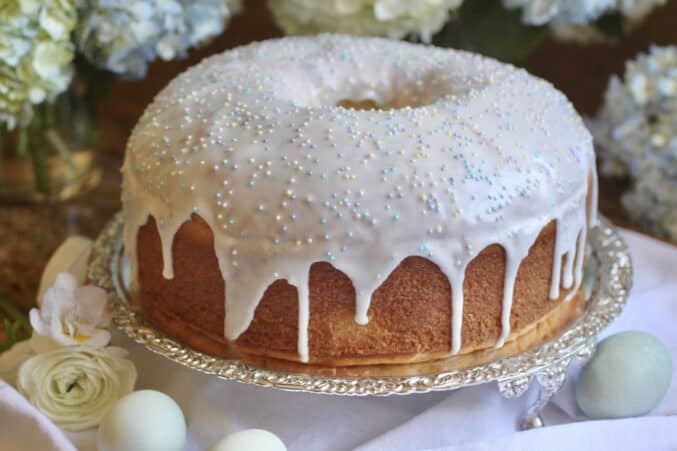
This not too sweet, light and airy Easter cake is more of a cake-bread than simply a cake.
As an Amazon Associate I earn from qualifying purchases.
It is made with yeast and rises up beautifully, and becomes light as a feather! It may look like a heavy cake in the photo, but I can assure you it is the opposite. It’s an alternative (or an addition) to a traditional Italian colomba which is another Easter cake made with yeast.
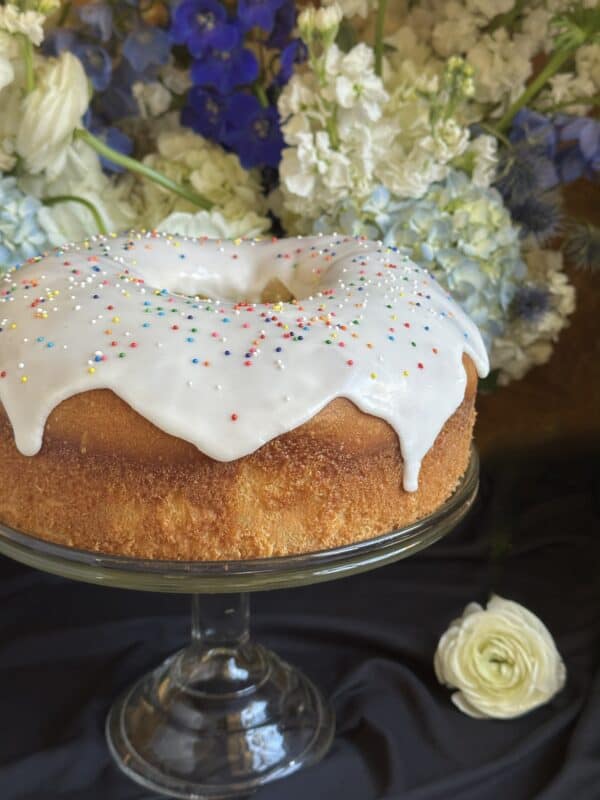
Maybe you’ve already made my individual Italian Easter bread rings?
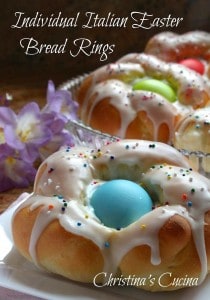
What is Easter Cake?
If you’ve ever had a panettone or pandoro for Christmas, or even an angel food cake, then you’ll be familiar with the light texture of this cake/bread. Easter cake is a tradition in Italy, and for Italian families around the world. It’s normally made in a bundt style, iced with plain white icing and covered in sprinkles. The icing makes up for the fact that there’s not much sugar in the cake.
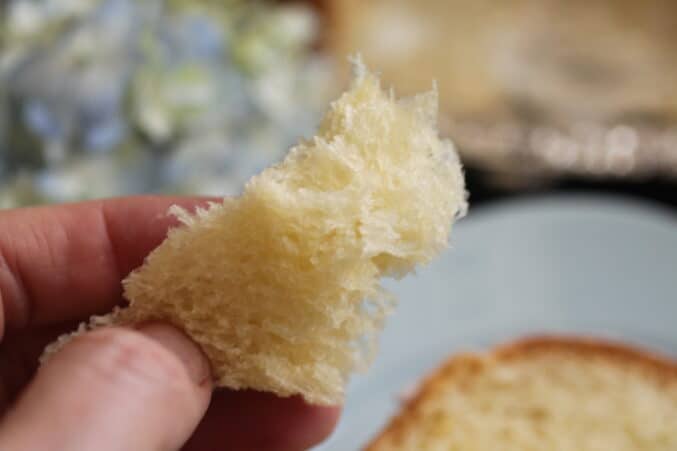
It makes the perfect Easter morning breakfast treat. A slice in the afternoon with your tea or coffee is a winner, but it is a lovely ending to an Easter meal. Especially if you’re having a big feast, this cake will hit the spot.
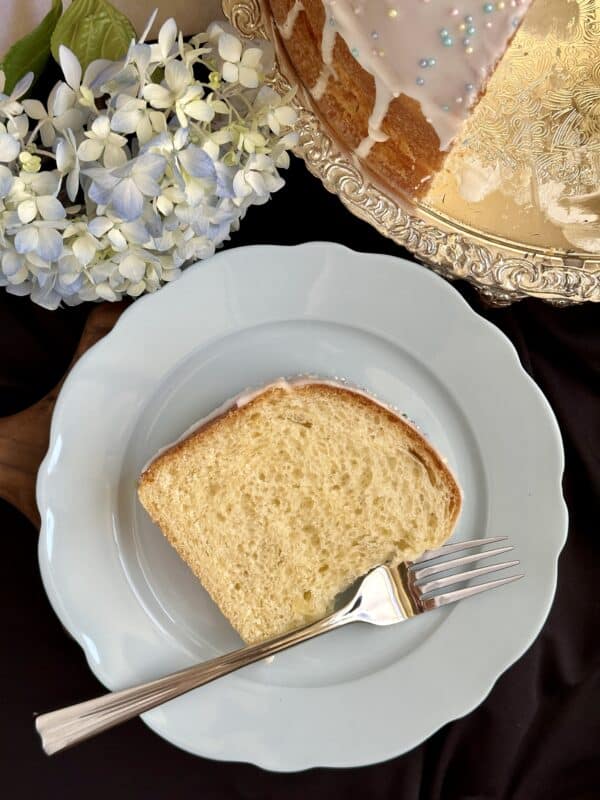
The recipe provided makes three large cakes, however, you can make just one if you choose (see notes in the recipe card). For convenience and ease, I have adapted this authentic Italian Easter cake recipe (or pigna di Pasqua) for the bread machine.
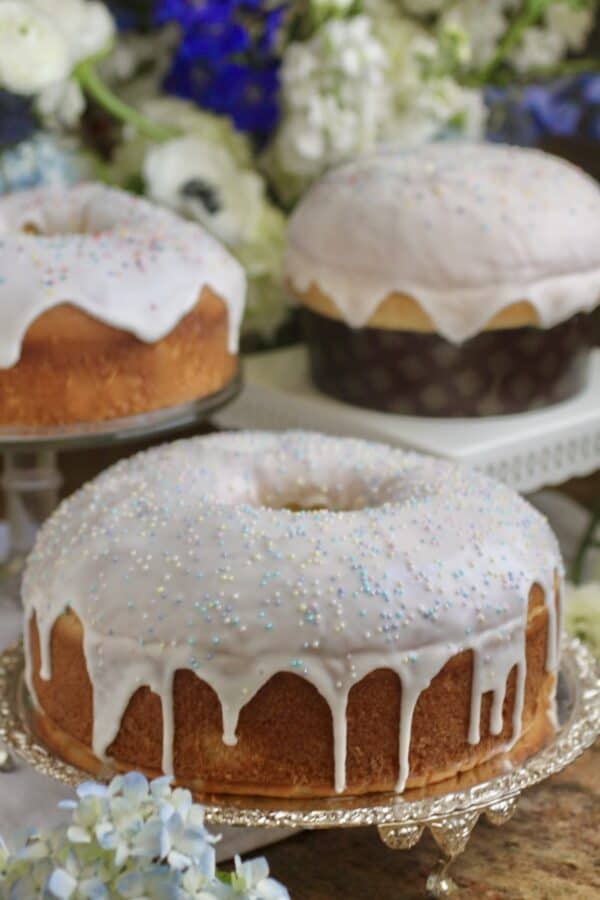
Need a savory Italian Easter recipe? Try this pizza rustica, or Italian Easter pie.
The nice thing about making three cakes is that you can gift them (or freeze them). You can make them in a plain bundt tin, or create your own bundt tin, as I’ll show you below. You can also make them without the hole in the middle. I used a panettone paper case for this cake even though it’s a short one (the taller ones are better for this cake).
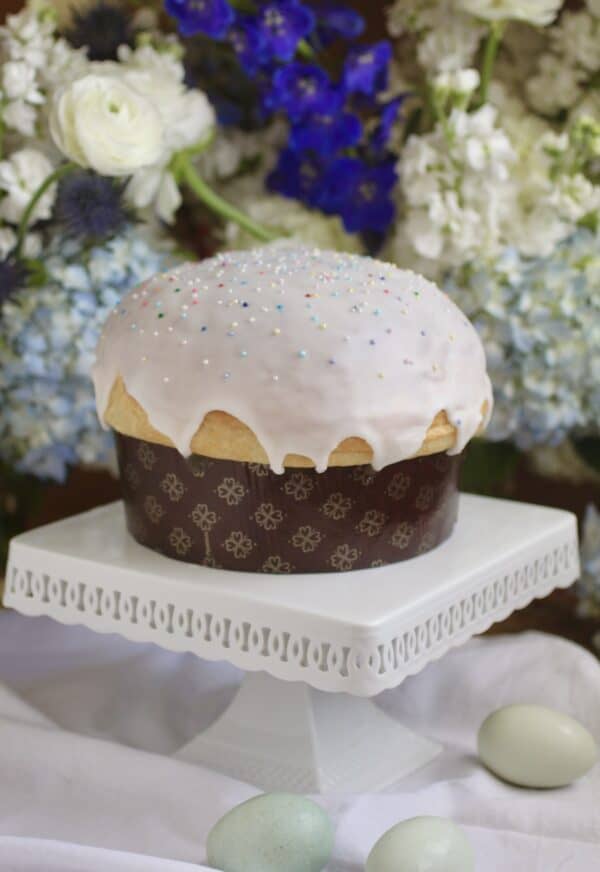
Another pretty addition to your Easter dessert table: flower cupcakes
(easy to make with step by step directions)!

And where is this recipe from?
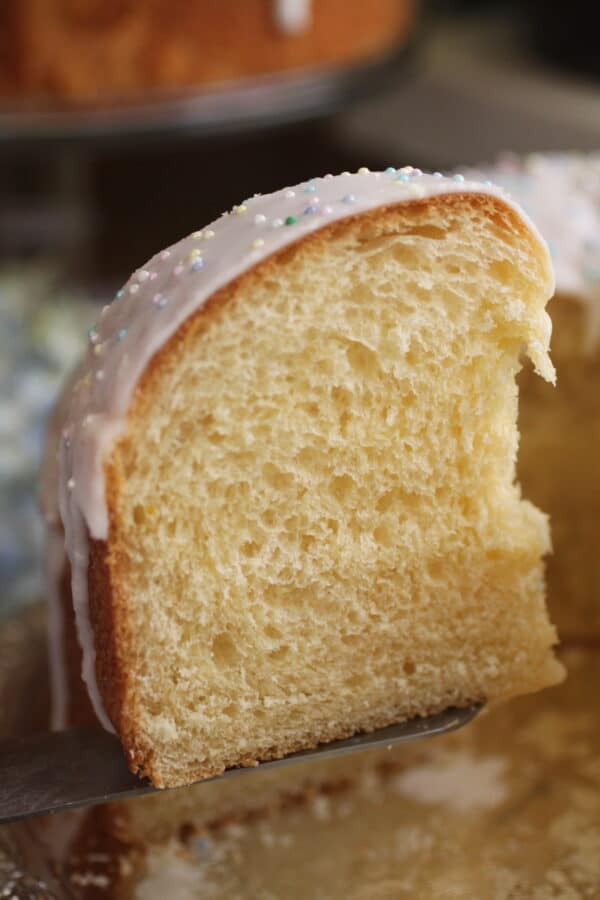
Well, in true Italian fashion, my Zia Francesca (who is featured on my site via my limoncello recipe and penne alla vodka recipe) got the recipe from her friend, who also happens to be my mother’s childhood friend, Pasqualina. Incidentally, Pasqua = Easter in Italian, so how perfect is that?
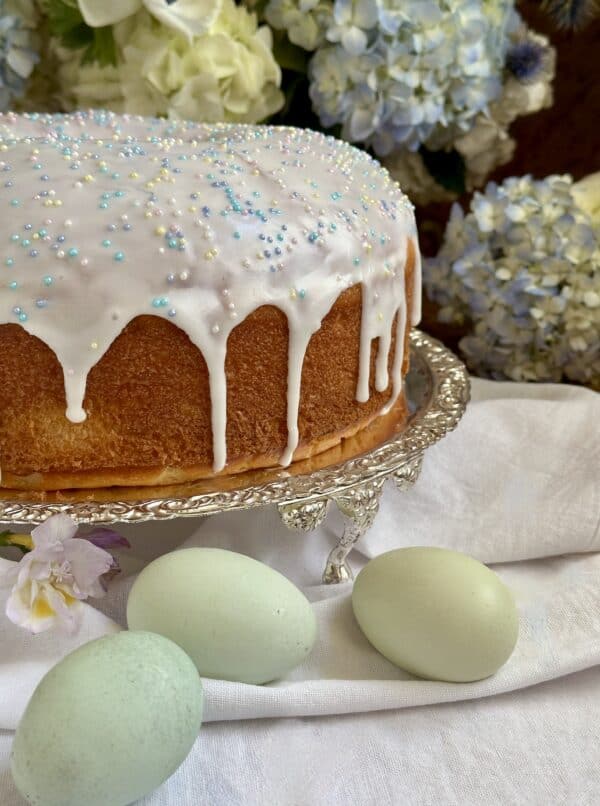
Note: this is not a very sweet dough, so if you plan on skipping the icing, you may want to increase the amount of sugar slightly.
Easter Cake Recipe (Pigna di Pasqua)
recipe from Zia Francesca, via Pasqualina makes 3 large cakes
FULL PRINTABLE RECIPE BELOW
Ingredients
- milk
- eggs
- olive oil
- anisette or Sambuca (or other liqueur) or anise extract for alcohol free
- grated lemon rind
- sugar
- all purpose flour
- salt
- active dry yeast
ICING/DECORATION - confectioner’s/powdered sugar
- lemon juice and/or water
- edible sprinkles
Directions for Bread Machine (see recipe card for stand mixer instructions, too)
Place all the liquid ingredients in the bread machine container: milk, eggs, oil, and liqueur.
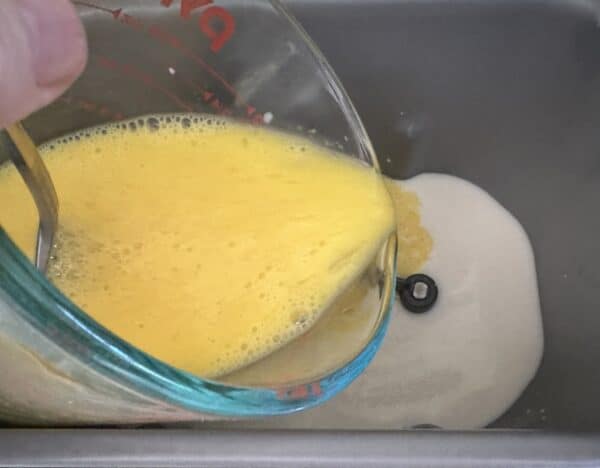
Next, add the grated lemon rind. (I use a Microplane zester.)
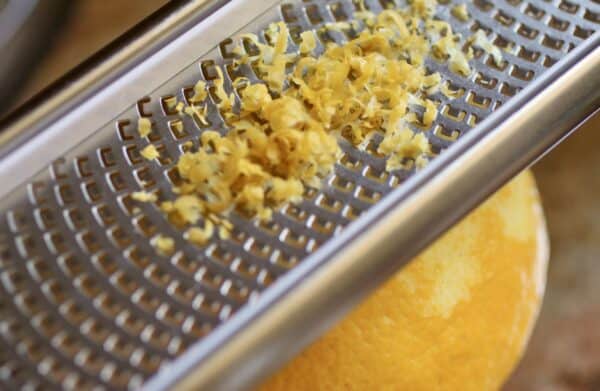
Then add the dry ingredients, except for the yeast: sugar, flour, and salt. Put in the minimum amount of flour to begin.
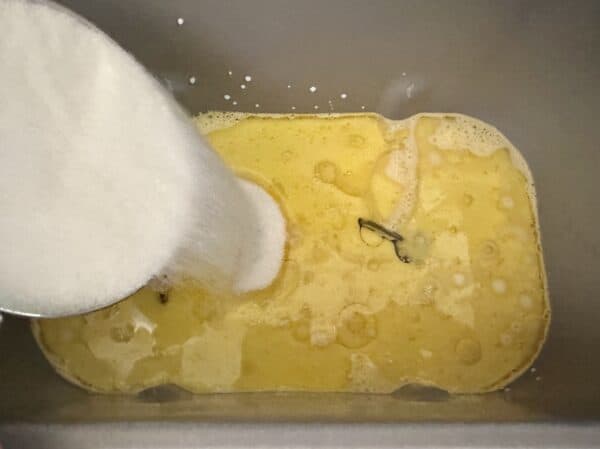
Make a well in the top of the flour and add the yeast, then set the bread machine to make dough and run. After the dough has come together in the machine, add more flour if needed. It should be a slightly sticky dough.
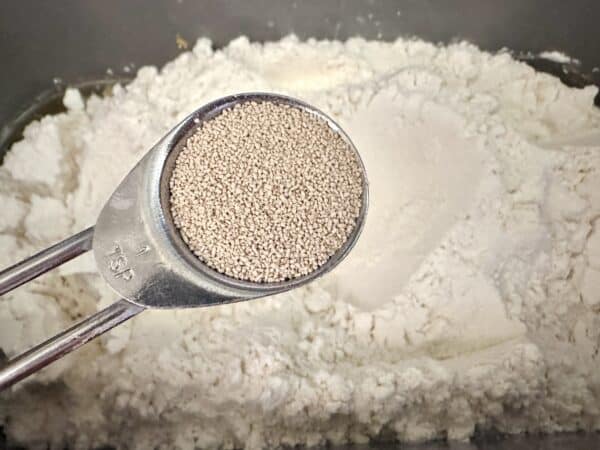
Allow the dough to double in size. When ready, empty onto a countertop dusted with flour.
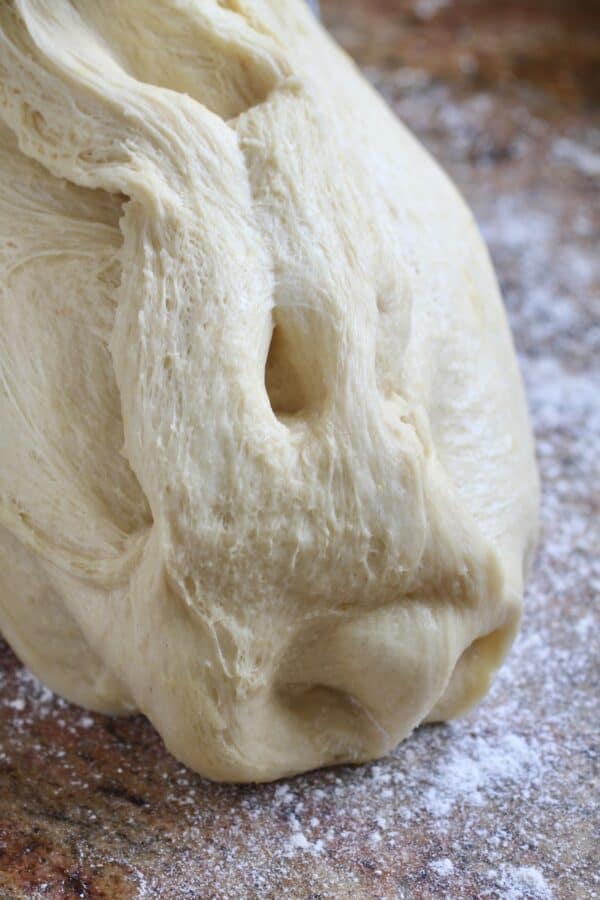
Knead gently, then divide into three parts. If you are using the same size tins, divide evenly, if not, adjust accordingly.
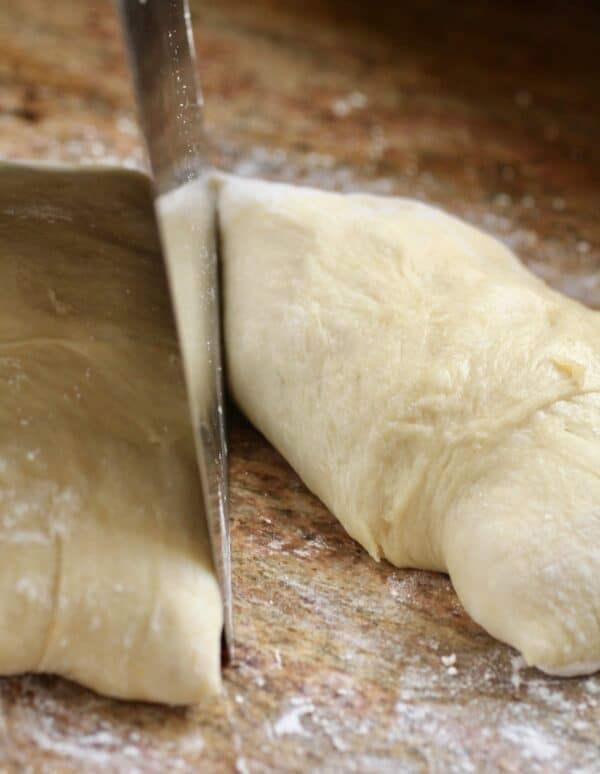
For a regular cake, shape each piece into a round ball and place into a buttered and floured tin (you can add parchment paper to the bottoms for easy removal.
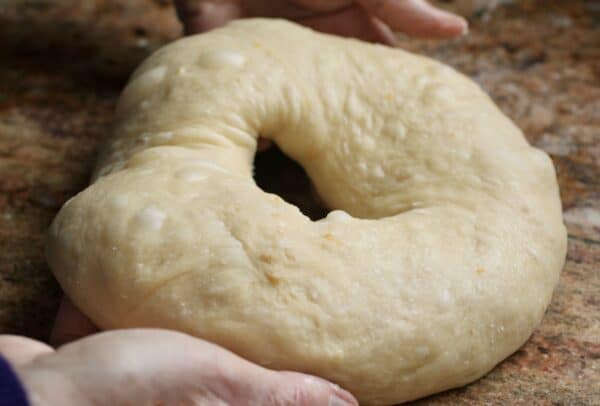
For a bundt cake, you will still start with a round ball. (If you don’t have a bundt tin, you can use a glass or jar filled with rice, and buttered, or covered on the outside with parchment).
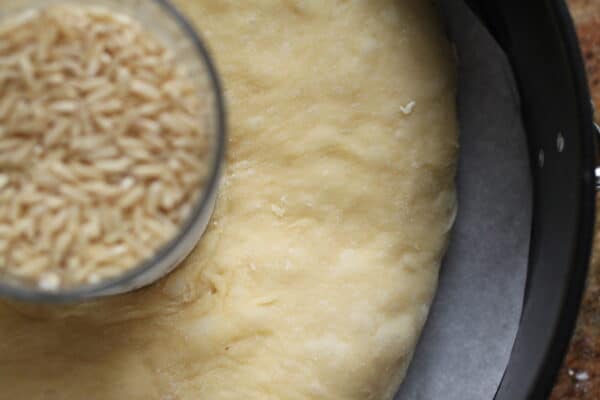
When you have shaped the round ball, use your fingers to make a hole in the center. Stretch the middle hole, and place into the tin and repeat with the other two pieces of dough. Cover and allow to rise for 3 to 5 hours, until well-risen. I have bundt tins, but I did this to show you how to make a bundt cake without a bundt tin, especially since this recipe makes 3 cakes.
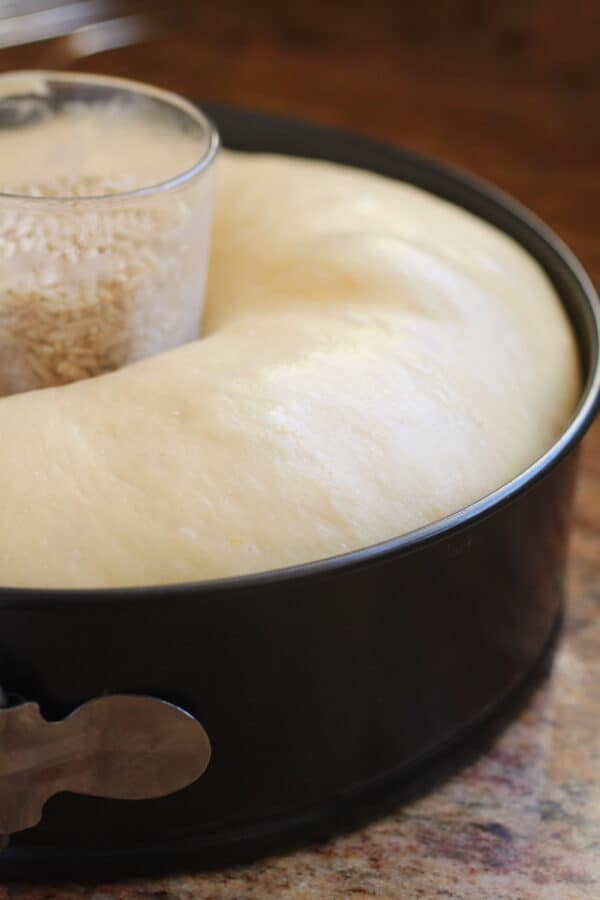
Bake the Easter Cakes
Preheat the oven to 350 F (175 C). Bake for approximately 25 minutes or until the cake is ready. They should be golden brown and extremely light (in weight).
Allow to cool in the pan for about 45 minutes, then remove sides, bottom, paper and the glass jar (twist and turn to remove gently).
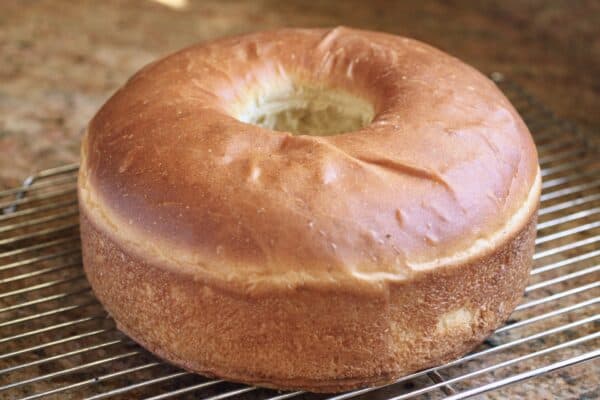
While the cakes are cooling, make the icing.
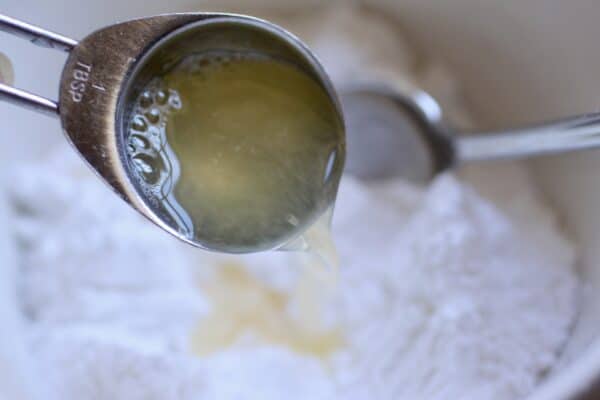
Stir the lemon juice and water into the powdered sugar until it is smooth and the consistency of thick honey.
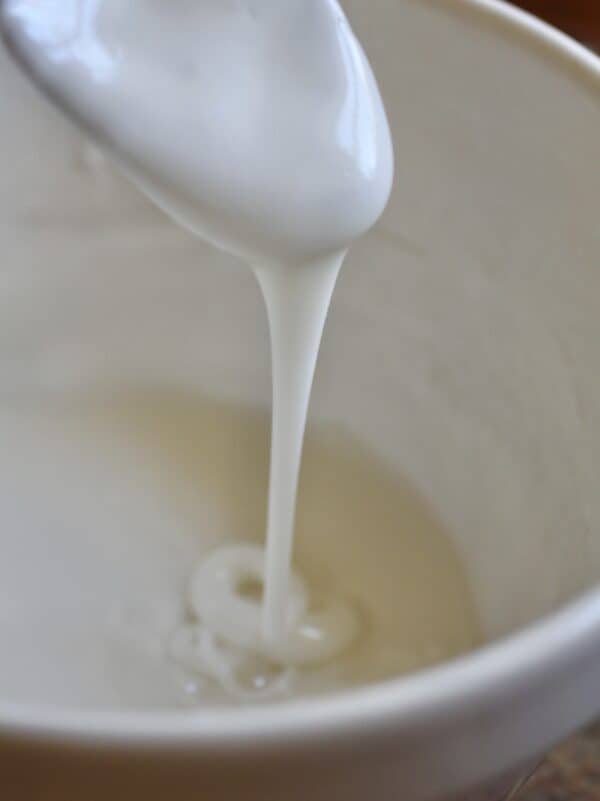
Keep it covered until ready to use.
Ice and Decorate the Cakes
Generously spread the icing over the tops of the cool cakes. Do one cake at a time because you have to add the sprinkles quickly, before the icing starts to set.
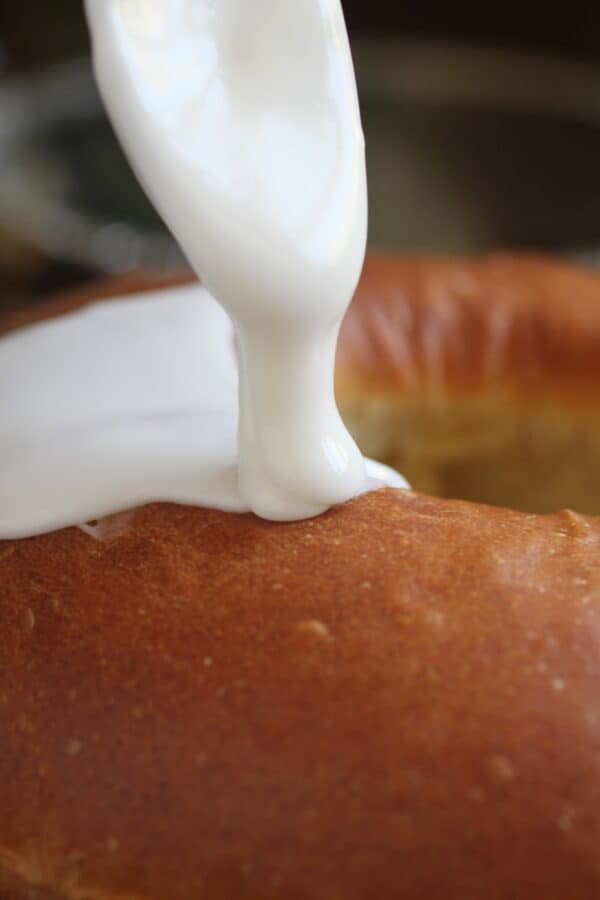
Once you’re happy with the icing (help it to drip down where you want), then add the sprinkles. (I like this Bakersfield brand of sprinkles because they are made in Mexico.)
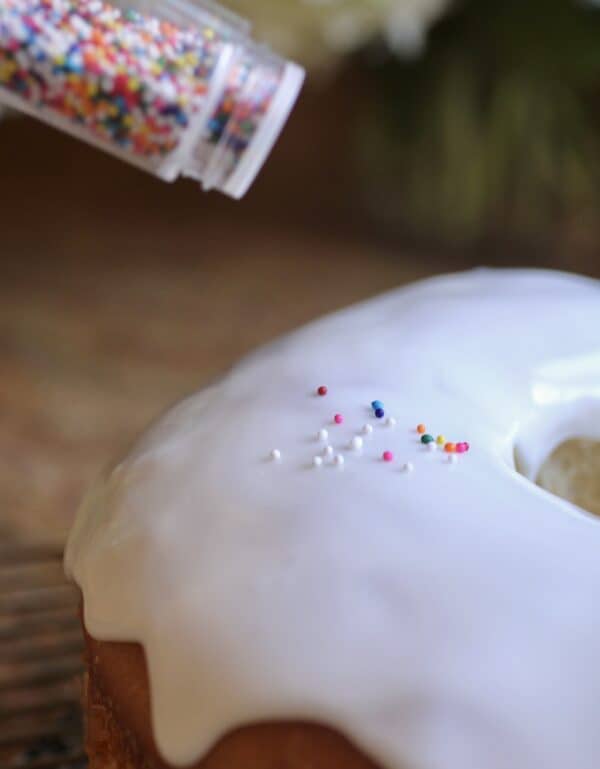
Allow to set before touching the cakes, then serve or put in an airtight tin. See, wasn’t that easy!?
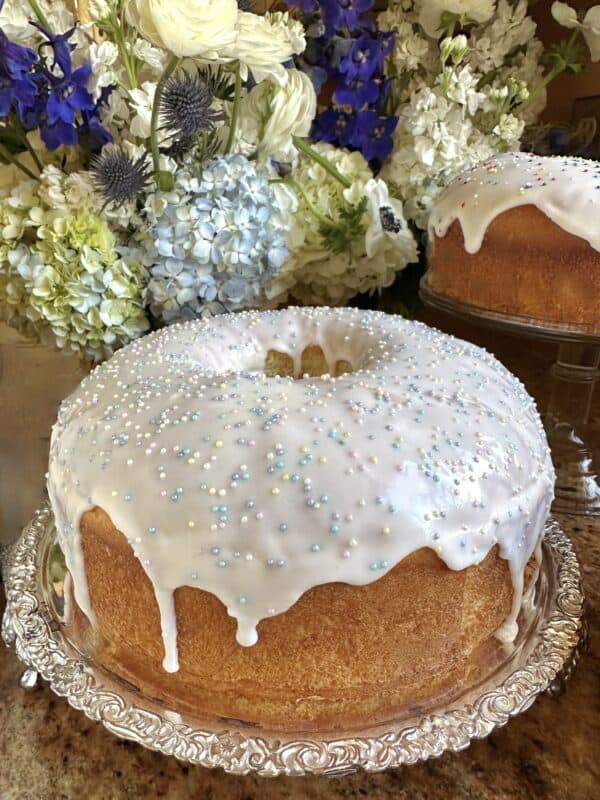
Make sure the icing is cold and set before attempting to cut the Easter cake.
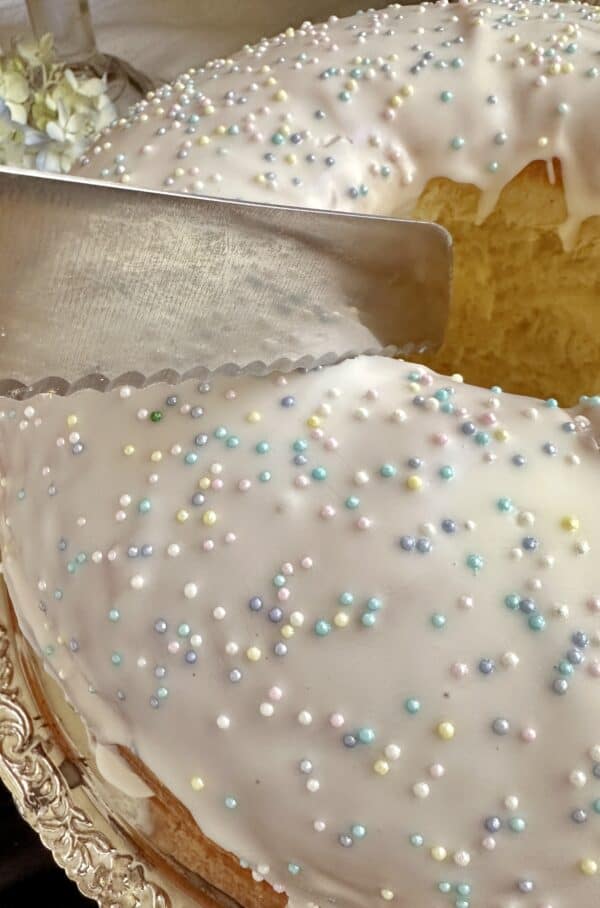
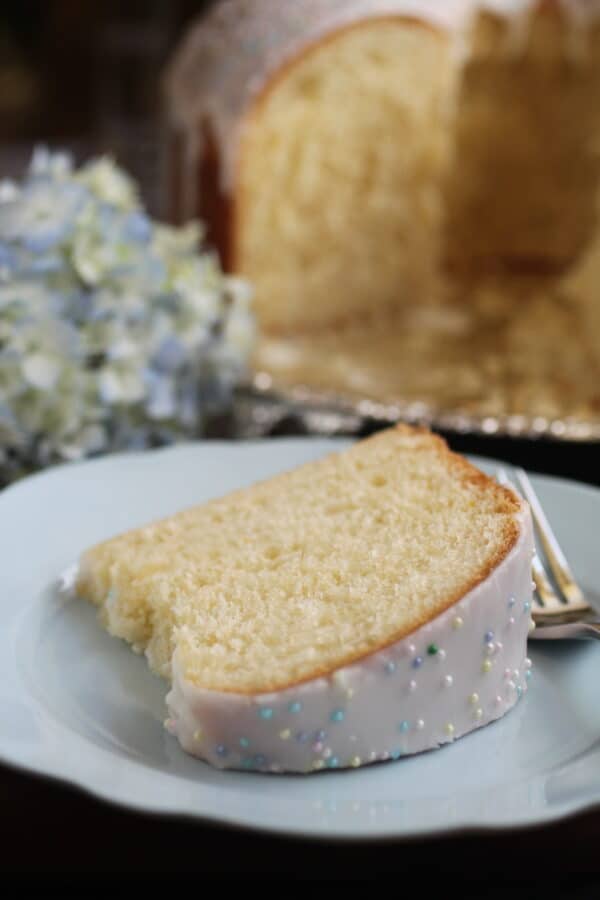
So light and delicious, you can eat it with your hands!
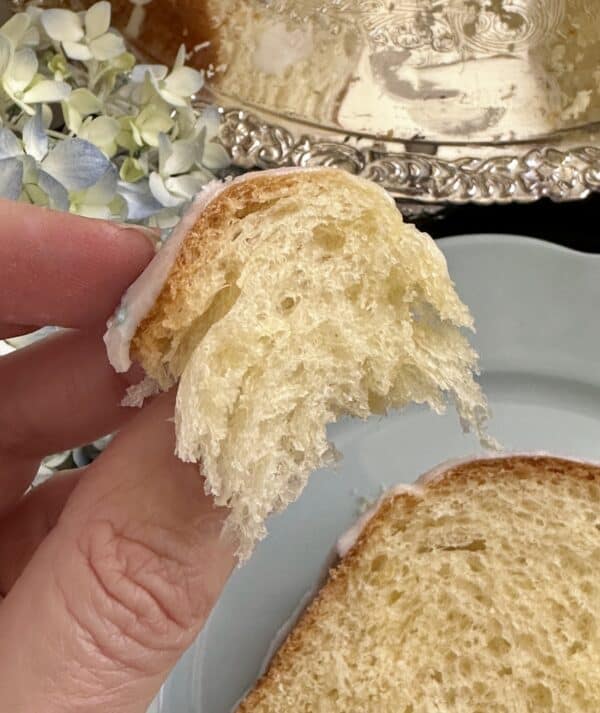
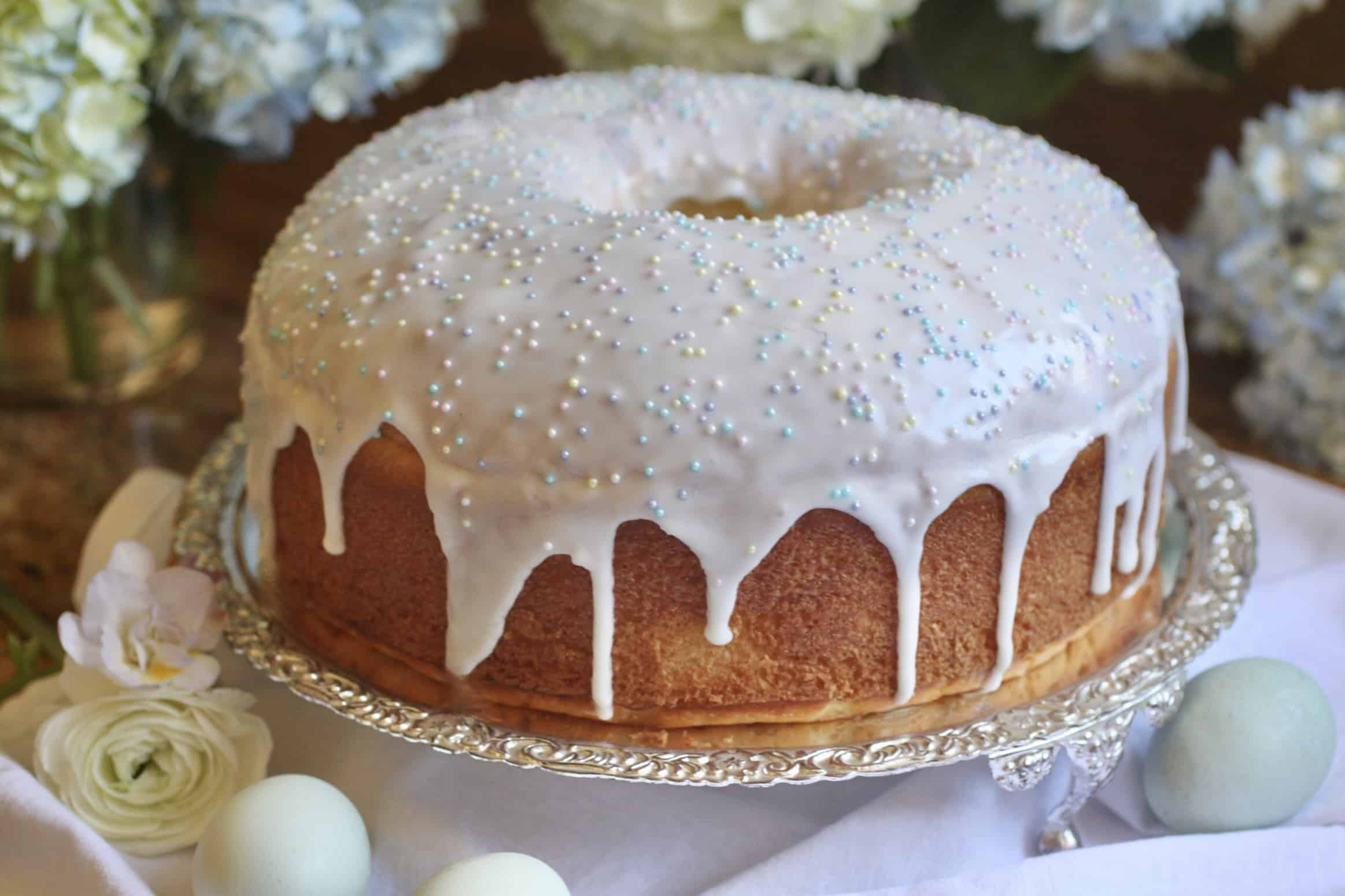
Easter Cake
Special Equipment
- 3 9" (23 cm) springform pans (Use 10" springform pans if you are making bundt-shaped cakes, and don't have bundt pans)
Ingredients
- 1 cup milk (warm)
- 6 eggs (beaten)
- 6 oz light olive oil
- 3 Tbsp anisette (or Sambuca, or other liqueur)
- 1 large lemon rind (grated)
- 1 ¼ cups sugar
- 6 cups all-purpose flour (up to 7 cups or 840 g if using metric)
- ⅛ tsp salt
- 2 ¼ tsp active dry yeast
Icing & Decoration
- 4 cups confectioner's sugar (powdered sugar)
- 4 ½ Tbsp lemon juice (and/or water)
- 1 Tbsp edible sprinkles (as needed for decorating)
Instructions
Directions for Bread Machine:
- Place all the liquid ingredients in the bread machine container: milk, eggs, oil, and liqueur.
- Next, add the grated lemon rind.
- Then add the dry ingredients, except for the yeast: sugar, flour, and salt. Put in the minimum amount of flour to begin.
- Make a well in the top of the flour and add the yeast, then set the bread machine to make dough and run. Once the dough has come together, add more flour if needed. It should be a slightly sticky dough. SKIP THE DIRECTIONS FOR THE STAND MIXER.
Directions for Stand Mixer:
- Place the yeast in the warm milk and let stand until it dissolves and is activated.
- In the stand mixer, beat the eggs and sugar for 3 or 4 minutes. Change to the dough hook. Add the milk and yeast, oil and liqueur and lemon rind, and mix on low, just to combine the liquid ingredients.
- Begin adding the flour a little at a time until a soft, slightly sticky consistency is reached. The texture will change after kneading for some time. Knead for at least 10 minutes, then shape into a ball, and cover the dough.
Shape and Bake the Easter Cakes
- Butter and flour (and put parchment paper on the bottom) of 3, 9" springform pans if making full cakes.
- Allow the dough to double in size. When ready empty onto a countertop dusted in flour. Knead gently, then divide into three parts. If you are using the same size tins, divide evenly, if not, adjust accordingly.
- For a regular cake, shape each piece into a round ball and place into a buttered and floured tin (you can add parchment paper to the bottoms for easy removal.
- For a bundt cake, you will still start with a round ball. (If you don't have a bundt tin, you can use a glass or jar filled with rice, and buttered, or covered on the outside).
- When you have the round, use your fingers to make a hole in the center. Stretch the middle hole, and place into the tin and repeat with the other two pieces of dough. Cover and allow to rise for 3 to 5 hours, until well-risen.Preheat the oven to 350 F (175 C).
- Bake the Easter cakes for approximately 25 minutes or until the cake is ready. They should be golden brown and extremely light (in weight).
- Allow to cool in the pan for about 45 minutes, then remove sides, bottom, paper and the glass jar (twist and turn to remove gently).
- While the cakes are cooling, make the icing.
Make the Icing:
- Stir the lemon juice and water into the powdered sugar until it is smooth and the consistency of thick honey.
- Keep covered until ready to use.
Ice and Decorate the Cakes
- Generously spread the icing over the tops of the cool Easter cakes. Do one cake at a time because you have to add the sprinkles quickly, before the icing starts to set.
- Once you're happy with the icing (help it to drip down where you want), then add the sprinkles.
- Allow to set before touching the cakes, then serve or put in an airtight tin.
Notes
- Skip the icing, and sprinkles for a less sweet cake.
- This is not a very sweet dough, so if you do plan on skipping the icing, you may want to increase the amount of sugar slightly.
- Use a 9" springform pans if making a full cake, or a 10" springform pan if you are making a bundt shaped cakes and don't have a bundt pan.
- Ingredients for one cake:
- ⅓ cup (80 ml) warm milk
- 2 eggs, beaten
- 2 oz (60 ml) light olive oil
- 1 Tbsp anisette or Sambuca (or other liqueur)
- 6 ½ Tbsp sugar
- 2 to 2 ⅓ cups (240 g to 280 g) all purpose flour
- pinch of salt
- ¾ tsp active dry yeast
- Decoration
- 1 ⅓ cups (130 g) confectioner's/powdered sugar
- about 1 ½ Tbsp lemon juice and water
- sprinkles
Nutrition
Christina’s Cucina is a participant in the Amazon Services LLC Associate Program, an affiliate advertising program designed to provide a means for sites to earn advertising fees by advertising and linking to Amazon.com.


my granddaughter made this a couple weeks ago for us to enjoy with our coffee/tea Easter morning. It was tasty and not super sweet. Next time we will have with espresso from a moka coffee pot!
Lovely to hear, Susie! Good luck!
I followed the pigna recipe, but with less icing and an extra couple of spoons of sambuca. The fragrance of the dough is amazing. My mom said it reminded her of her childhood in Italy. Thank you for making it so comprehensive… I’m not used to cooking with yeast and the step by step made it very easy.
Delighted to hear it, Linda! Thank you for letting me know, it makes me happy!
Looks lovely! I make a savory Easter Pie every year, using basket cheese and Italian meats. I’ve never made Easter Cake, but this looks so beautiful I’m going to give it a try. The pastel sprinkles against the white icing…beautiful. A slice of this pair would pair well with a nice espresso brewed fresh with my Bialetti moka coffee pot.
This is a beautiful cake, and it sounds fantastic. I would love to try it, even if I missed Easter! Thanks for making the edits others requested — you are the best!
hello, is the first recipe for a single cake only?
The 6 eggs is for 3 cakes. The one in the notes is for 1 cake.
It could be helpful if you add the size of tins or Bundt cake we need for 1 cake. There are of different diameter and I’m sure even the cooking length would be different. Not sure I’ll try without more info on these issues 😉 nice cakes though
Hi Laura, sorry I didn’t add it in the notes, but it’s the same size pans whether you make 3 or 1 (you just use one pan vs. 3). I have updated it. Let me know if you try it!
The number of eggs in the single cake recipe is the same as the recipe for 3 cakes. Pretty sure it should be only 2 eggs in the single cake recipe. Also the word ‘flour’ is missing in your list of ingredients for both versions of the recipe. There is a quantity but no actual ingredient. Is it just all-purpose flour?
Hi Sue, unfortunately, I can’t fire my editor (ME!) however, I have fixed the errors. Thank you so much for catching those, and yes, it’s all-purpose flour. Let me know if you try it!